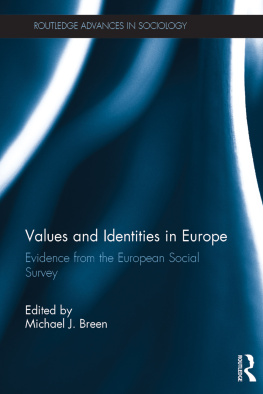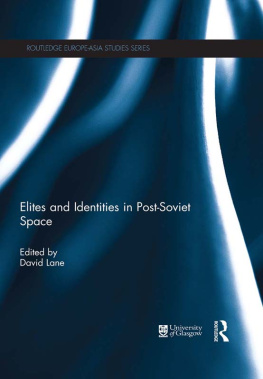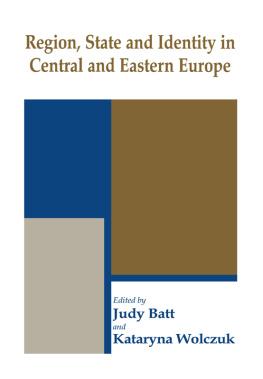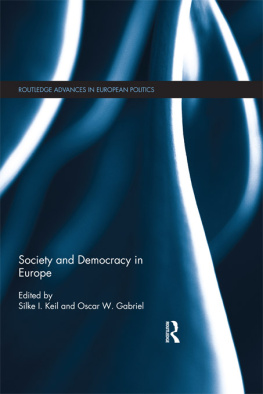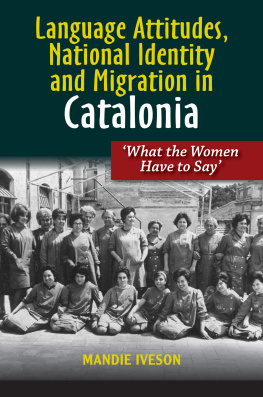Values and Identities in Europe
Contrary to what is suggested in media and popular discourses, Europe is neither a monolithic entity nor simply a collection of nation states. It is, rather, a union of millions of individuals who differ from one another in a variety of ways while also sharing many characteristics associated with their ethnic, social, political, economic, religious or national characteristics.
This book explores differences and similarities that exist in attitudes, beliefs and opinions on a range of issues across Europe. Drawing on the extensive data of the European Social Survey, it presents insightful analyses of social attitudes, organised around the themes of religious identity, political identity, family identity and social identity, together with a section on methodological issues. A collection of rigorously analysed studies on national, comparative and pan-European levels, Values and Identities in Europe offers insight into the heart and soul of Europe at a time of unprecedented change. As such, it will appeal to scholars across the social sciences with interests in social attitudes, social change in Europe, demographics and survey methods.
Michael J. Breen is Chair of the European Social Survey (ESS) and Dean of the Faculty of Arts at Mary Immaculate College, University of Limerick, Ireland.
Routledge Advances in Sociology
For a full list of titles in this series, please visit www.routledge.com/series/SE0511
196 Praxeological Political Analysis
Edited by Michael Jonas and Beate Littig
197 Austere Histories in European Societies
Social Exclusion and the Contest of Colonial Memories
Edited by Stefan Jonsson and Julia Willn
198 Habermas and Social Research
Between Theory and Method
Edited by Mark Murphy
199 Interpersonal Violence
Differences and Connections
Edited by Marita Husso, Tuija Virkki, Marianne Notko, Helena Hirvonen and Jari Eilola
200 Online Hate and Harmful Content
Cross National Perspectives
Pekka Rsnen, Atte Oksanen, Matti Nsi and Teo Keipi
201 Science, Technology and the Ageing Society
Tiago Moreira
202 Values and Identities in Europe
Evidence from the European Social Survey
Edited by Michael J. Breen
203 Humanist Realism for Sociologists
Terry Leahy
204 The Third Digital Divide
A Weberian Approach to Digital Inequalities
Massimo Ragnedda
Values and Identities in Europe
Evidence from the European Social Survey
Edited by Michael J. Breen

First published 2017
by Routledge
2 Park Square, Milton Park, Abingdon, Oxon OX14 4RN
and by Routledge
711 Third Avenue, New York, NY 10017
Routledge is an imprint of the Taylor & Francis Group, an informa business
2017 selection and editorial matter, Michael J. Breen; individual chapters, the contributors
The right of Michael J. Breen to be identified as the author of the editorial material, and of the authors for their individual chapters, has been asserted in accordance with sections 77 and 78 of the Copyright, Designs and Patents Act 1988.
All rights reserved. No part of this book may be reprinted or reproduced or utilised in any form or by any electronic, mechanical, or other means, now known or hereafter invented, including photocopying and recording, or in any information storage or retrieval system, without permission in writing from the publishers.
Trademark notice : Product or corporate names may be trademarks or registered trademarks, and are used only for identification and explanation without intent to infringe.
British Library Cataloguing in Publication Data
A catalogue record for this book is available from the British Library
Library of Congress Cataloging in Publication Data
[CIP data]
ISBN: 978-1-138-22666-1 (hbk)
ISBN: 978-1-315-39714-6 (ebk)
Typeset in Times New Roman
by Deanta Global Publishing Services, Chennai, India
To Noreen OLoughlin, Fiachra Braoin, and Doireann N Bhraoin
Contents
MICHAEL J. BREEN
RYAN T. CRAGUN
ANNA KULKOVA
CAILLIN REYNOLDS
MICHAEL OCHSNER AND IVETT SZALMA
AMY ERBE HEALY AND SEN RIAIN
MARGUERITE BEATTIE
KRISTYNA CHABOVA
DNIEL OROSS AND ANDREA SZAB
AOIFE PRENDERGAST
ALEXANDRA LIPASOVA
MARE AINSAAR
IVETT SZALMA AND JUDIT TAKCS
HELGE BAUMANN
BRENDAN HALPIN AND MICHAEL J. BREEN
ANA VILLAR AND RORY FITZGERALD
Mare Ainsaar is a senior research fellow at the Institute of Social Studies at the University of Tartu (Estonia). She defended her PhD degree at University of Turku (Finland) on social policy and migration. Currently, she is also head of a unit of a social policy research group at University of Tartu. She had served as a counsellor for the Minister of Family and Population Affairs in Estonia, advising on gender, children and family issues. Her current main research interests are related to family, health policies, fertility policy and public policy on gender issues. She is the author of more than 200 scientific publications. She has been a project leader for many international projects, including the ESS in Estonia.
Helge Baumann studied social science, classical philology and empirical research methods at the Ruhr University in Bochum, Germany. In 2012, he joined the Institute for Innovation Research and Management in Bochum. He currently works as a research assistant at the Hans Bckler Foundation in Dusseldorf, Germany, where he conducts and analyses representative works councils surveys. His research priorities comprise works councils research and survey methodology. He is writing his PhD thesis on links between various error sources in large computer-assisted telephone interviewing (CATI) surveys, including non-response and measurement bias.
Marguerite Beattie received her bachelors degree at the University of Virginia and is currently a postgraduate student at the University of Helsinki. While her primary research interests include subjective well-being and equality, she has also delved into health psychology in her thesis involving health behaviour change and mindfulness.
Michael J. Breen is dean of the Faculty of Arts at Mary Immaculate College, University of Limerick, Ireland. He holds undergraduate degrees from University College Dublin and the University of St. Thomas Aquinas, Rome; and a MS and PhD from Syracuse University, New York. He is currently chair of the ESS and also chair of the European Values Study (EVS) General Assembly. He is a member of the Irish Research Councils International Advisory Board and a former Government of Ireland Research Fellow. He is a director of the Irish Centre for Catholic Studies and of the Centre for Culture, Technology and Values, both located at Mary Immaculate College. A quantitative researcher, his primary research interests lie in the area of values, religious practice and social change.
Kristyna Chabova is a PhD student at Charles University in Prague, where she is finishing her final year of studies, and she has a Master of Science (MSc) in sociology from the University of Oxford. Her research is focused on corruption in post-communist countries and especially on the possible reasons why some post-communist countries have succeeded in reducing corruption while others have not. As part of her studies, she was a visiting PhD student at Hertie School of Governance in Berlin under the supervision of Prof. Alina Mungiu-Pippidi. She was also an exchange student at George Washington University in Washington, DC, and at Sciences-Po in Paris. She is associate professor at Charles University, where she co-teaches courses on data journalism, the welfare state and political sociology. At the same time, she is working as a researcher in the Academy of Science in the Czech Republic, Institute of Sociology in the Department of Value Orientations in Society.
Next page
